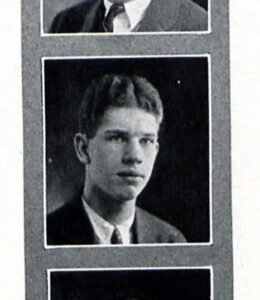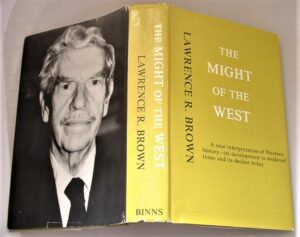Who Was Lawrence R. Brown?
Biographical Notes on the Author of The Might of the West
(September 1, 1903 – March 31, 1986)

Yearbook photo, c. 1920
It is intriguing, and often maddening, to research an author or historical figure, and discover that there’s very little material to be found. With today’s newspaper and genealogical databases, such lack of information is itself suspicious. Perhaps the person just didn’t want to be found, or spent his life trying to keep his name out of the newspapers. And there’s always the possibility that for practical or professional reasons our subject wrote mostly under pseudonyms, like “Lewis Carroll” or “Ulick Varange.”
Researching the life of Lawrence R. Brown presents us with yet another obstacle, what you might call the “James Jones” gambit. If you’re an author with a common moniker, you might be able to sign your name to your writings and “hide in plain sight” if you like. Lawrence R. Brown often looks to be an example of such self-willed obscurity. He wrote one immensely readable philosophy of history, The Might of the West (first edition, 1963, second hardbound edition 1979), which was very well received in certain quarters. But little else was known about him.
While sorting through the many possible Lawrence R. Browns in the online databases, I briefly became briefly convinced that Brown held a sensitive Defense Department position for many years. Alas, my favorite candidate turned out to be an interesting guy but the wrong guy. His relatives never heard of him publishing any sort of book.
The necessary clue came from syndicated columnist John Chamberlain, who praised Brown and his book in 1966. [1] His encomium for Brown is an eye-opener, and alerted me to the varied interests of that polymath. Under the headline ‘Is United States “Banana Republic”?’, Chamberlain’s column mocks the single-assassin verdict of the Warren Commission Report on the assassination of President Kennedy. His piece de resistance is a recent article by our obscure Mr. Brown, here described as both “engineer” and “philosopher of history.” A couple of paragraphs from the Chamberlain column will serve here as a précis:
So let’s turn to a remarkable article by Lawrence R. Brown, “Kennedy’s Assassination: Let’s Solve It,” which appeared in September in the first issue of a new Catholic magazine called Triumph. Mr. Brown is an engineer, but on the side he is a gifted philosopher of history, as his only book, a bulky tome called The Might of the West, abundantly proves.
Brown goes about establishing a thesis the way Charles Lindbergh prepared for his pioneer flight across the Atlantic, leaving nothing to chance. His article on the assassination does not deal in motives; it simply concentrates on what might be called the “hardware” questions. One such question is raised by the author’s insistence that spectrographic analysis could not establish that all the bullets or metal fragments came from Oswald’s Mannlicher-Carcano rifle. Brown suggests that two separate sets of bullets may have been involved, or that there may have been “planted clues.”
(John Chamberlain column, November 30, 1966, King Features Syndicate.)
Based on Chamberlain’s claim that Brown was an engineer, it appears that the real Lawrence R. Brown was Lawrence Roscoe Brown, a chemical engineer who worked for 37 years as a senior manager for Publicker Industries, a Philadelphia beverage distillery and industrial-chemical manufacturer. He was born in Stonington, Connecticut on September 1, 1903, and died in a Burlington, Vermont hospital on March 31, 1986. [2] In between, Brown lived in New York City, suburban Philadelphia, and the southern Maryland exurbs of Washington DC (La Plata, MD). [3]
Chamberlain’s column also tell us that Brown has written a soon-to-be-published second book, an in-depth technical criticism of the Warren Report. This book appears to be lost to history. Why? Perhaps it was too granular and techie: Brown’s mastery of spectrographic analysis and other abstruse metrics would not readily be imparted to a wide audience. (That three-page 1966 Triumph article is eye-glazing in its detail.[4]) Or maybe Brown couldn’t find a publisher because the market was thought to be saturated with JFK assassination “conspiracies.”
And then there’s the fact that Brown didn’t have good relations with his old publishing company, which had passed to unfriendly hands shortly after publication of The Might of the West. In his 1979 review of the second edition, Revilo Oliver suggests the new owners of the publishing house actively suppressed distribution of the book.[5]

The Might of the West, 1979 Edition
Brown contributed essays and commentary to Triumph sporadically from the mid-1960s to mid-1970s. In December 1966 he turned to Catholic liturgy, presenting arguments for the preservation of the Tridentine Mass, in a piece called “The Language of the West.” Vernacular liturgy is deficient, he writes, because it makes divisions along national and linguistic lines. “National churches” are popularly understood as a direct result of the Protestant Reformation of the 16th century, yet that was not (writes Brown) the Reformers’ intent. They merely wanted a reformed, more democratic, universal church.
“And now,” Brown grieves,
exit the Latin Mass. The Christian West, even in its bare form, cannot be said to exist when there is no longer so much as a symbol of it surviving, if only as a memorial to a common civilized past.
(Triumph, December 1966.)
This bears close comparison to parts of The Might of the West, particularly Brown’s depiction of the unity of the Christian West during the Middle Ages. In his gracious and appreciative 1979 review of that book, Revilo Oliver basically upheld that viewpoint, refusing to be distracted by Brown’s distinctly Catholic apologetics. The Protestant Reformation was a disaster, Prof. Oliver agreed, dividing the West into petty-state rivalries and fratricidal wars.
A more surprising piece of commentary came in March 1969 when he wrote a long letter to Triumph, taking a MacArthurish, “No substitute for victory” stance on America’s Vietnam policy. He slammed the undeclared war as a defeat, inasmuch as
our military forces have failed to attain the political objective which has been publicly declared to be the purpose of the use of military force in this area: the elimination of externally supported Communist military operations in South Vietnam… [The clear political intention of U.S. policies] is: “Avoid any action that will seriously irritate the Soviet Government.”
(Triumph, March 1969.)
Triumph had recently taken an editorial stand against the war, on the practical grounds that America didn’t really want to win it. This drew a fierce letter (January 1969) from professor/sci-fi writer Jerry Pournelle in Los Angeles, denouncing Triumph editors for defeatism.
Triumph immediately responded with an editorial, same issue, denying its defeatism while denouncing both the ongoing Paris Peace Talks and the war itself. Lawrence Brown’s disgusted response in the March issue manages to agree and disagree with both sides. A mildly interesting fracas over one of the more dismal geopolitical topics of the time.
Notes
[1] John Chamberlain, an economic historian and journalist, is scarcely remembered today, but he was very influential in the Conservative movement of the 1950s and 60s. Among other things he wrote the introduction to God and Man at Yale, a boost which former Yale Daily News Chairman William F. Buckley, Jr. later credited with “changing the course of my life.” Chamberlain was a columnist for King Features for 25 years. https://en.wikipedia.org/wiki/John_Chamberlain_(journalist). [2] Burlington (VT) Free Press obituary, April 4, 1986. [3] Residential information gathered from Ancestry.com, and Triumph magazine, March 1969. [4] Lawrence R. Brown, “Kennedy’s Assassination: Let’s Solve It,” Triumph, September 1966. Available at Internet Archive. [5] Revilo Oliver’s review has been reproduced in many places, including Instauration (December 1979), Counter-Currents, and National Vanguard. The last-named includes Prof. Oliver’s intriguing notes on how it was originally published by (entrepreneur/ investment banker) Ivan Obolensky, who then sold off his book company to someone who had no interest in Brown’s big-brained tome. Oliver’s notion that The Might of the West was deliberately suppressed almost certainly came from the author himself.That original 1963 Obolensky edition is readable today at Internet Archive; but not, alas, the 1979 edition, which Prof. Oliver informs us was a photo-offset reproduction of the original edition’s pages. Used copies now go for $200 or more online. Further trivia: the 1979 edition was brought out by Joseph J. Binns Publisher (Washington DC and New York), a company that appears to have specialized in lush “coffee table” travel-picture books, but also published works by Martin A. Larson, Ph.D., freelance scholar and longtime columnist for The Spotlight.
[6] Triumph (1966-1976) was founded by William F. Buckley, Jr.’s brother-in-law L. Brent Bozell, Jr., a sometime National Review editor who disliked the lukewarm conservatism and cultural secularism of that magazine. Triumph‘s masthead and contributors’ list overlapped a good deal with National Review‘s, though it was much more Catholic, boasting Willmoore Kendall, Jeffrey Hart, Russell Kirk, Otto von Habsburg, Hugh Kenner, Jerry Pournelle, and Bill Buckley’s younger brother F. Reid Buckley. Eventually the two magazines disavowed any connection. Lawrence R. Brown is frequently listed on the masthead as contributor or contributing editor. The major advertisers, unsurprisingly, were conservative book publishers and Rightist Catholic businessmen. Arlington House books, Conservative Book Club, and Patrick Frawley’s Schick razor blades bought prominent full-page insertions at the front of the book or back cover. When Triumph folded in 1976, its torch was carried on by another Bozell creation, the Christian Commonwealth Institute, and Christendom College in Virginia.